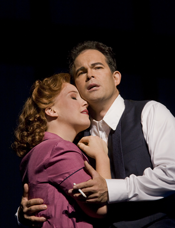
18 Nov 2008
Doctor Atomic and Arjuna’s Dilemma
As Tom Stoppard put it, “There is an art to the building up of suspense.”
English Touring Opera are delighted to announce a season of lyric monodramas to tour nationally from October to December. The season features music for solo singer and piano by Argento, Britten, Tippett and Shostakovich with a bold and inventive approach to making opera during social distancing.
This tenth of ten Live from London concerts was in fact a recorded live performance from California. It was no less enjoyable for that, and it was also uplifting to learn that this wasn’t in fact the ‘last’ LfL event that we will be able to enjoy, courtesy of VOCES8 and their fellow vocal ensembles (more below …).
Ever since Wigmore Hall announced their superb series of autumn concerts, all streamed live and available free of charge, I’d been looking forward to this song recital by Ian Bostridge and Imogen Cooper.
The Sixteen continues its exploration of Henry Purcell’s Welcome Songs for Charles II. As with Robert King’s pioneering Purcell series begun over thirty years ago for Hyperion, Harry Christophers is recording two Welcome Songs per disc.
Although Stile Antico’s programme article for their Live from London recital introduced their selection from the many treasures of the English Renaissance in the context of the theological debates and upheavals of the Tudor and Elizabethan years, their performance was more evocative of private chamber music than of public liturgy.
In February this year, Albanian soprano Ermonela Jaho made a highly lauded debut recital at Wigmore Hall - a concert which both celebrated Opera Rara’s 50th anniversary and honoured the career of the Italian soprano Rosina Storchio (1872-1945), the star of verismo who created the title roles in Leoncavallo’s La bohème and Zazà, Mascagni’s Lodoletta and Puccini’s Madama Butterfly.
Evidently, face masks don’t stifle appreciative “Bravo!”s. And, reducing audience numbers doesn’t lower the volume of such acclamations. For, the audience at Wigmore Hall gave soprano Elizabeth Llewellyn and pianist Simon Lepper a greatly deserved warm reception and hearty response following this lunchtime recital of late-Romantic song.
Collapsology. Or, perhaps we should use the French word ‘Collapsologie’ because this is a transdisciplinary idea pretty much advocated by a series of French theorists - and apparently, mostly French theorists. It in essence focuses on the imminent collapse of modern society and all its layers - a series of escalating crises on a global scale: environmental, economic, geopolitical, governmental; the list is extensive.
For this week’s Live from London vocal recital we moved from the home of VOCES8, St Anne and St Agnes in the City of London, to Kings Place, where The Sixteen - who have been associate artists at the venue for some time - presented a programme of music and words bound together by the theme of ‘reflection’.
'Such is your divine Disposation that both you excellently understand, and royally entertaine the Exercise of Musicke.’
Amongst an avalanche of new Mahler recordings appearing at the moment (Das Lied von der Erde seems to be the most favoured, with three) this 1991 Mahler Second from the 2nd Kassel MahlerFest is one of the more interesting releases.
‘And there was war in heaven: Michael and his angels fought against the dragon; and the dragon fought and his angels, And prevailed not; neither was their place found any more in heaven … that old serpent … Satan, which deceiveth the whole world: he was cast out into the earth, and his angels were cast out with him.’
If there is one myth, it seems believed by some people today, that probably needs shattering it is that post-war recordings or performances of Wagner operas were always of exceptional quality. This 1949 Hamburg Tristan und Isolde is one of those recordings - though quite who is to blame for its many problems takes quite some unearthing.
There was never any doubt that the fifth of the twelve Met Stars Live in Concert broadcasts was going to be a palpably intense and vivid event, as well as a musically stunning and theatrically enervating experience.
‘Love’ was the theme for this Live from London performance by Apollo5. Given the complexity and diversity of that human emotion, and Apollo5’s reputation for versatility and diverse repertoire, ranging from Renaissance choral music to jazz, from contemporary classical works to popular song, it was no surprise that their programme spanned 500 years and several musical styles.
The Academy of St Martin in the Fields have titled their autumn series of eight concerts - which are taking place at 5pm and 7.30pm on two Saturdays each month at their home venue in Trafalgar Square, and being filmed for streaming the following Thursday - ‘re:connect’.
The London Symphony Orchestra opened their Autumn 2020 season with a homage to Oliver Knussen, who died at the age of 66 in July 2018. The programme traced a national musical lineage through the twentieth century, from Britten to Knussen, on to Mark-Anthony Turnage, and entwining the LSO and Rattle too.
With the Live from London digital vocal festival entering the second half of the series, the festival’s host, VOCES8, returned to their home at St Annes and St Agnes in the City of London to present a sequence of ‘Choral Dances’ - vocal music inspired by dance, embracing diverse genres from the Renaissance madrigal to swing jazz.
Just a few unison string wriggles from the opening of Mozart’s overture to Le nozze di Figaro are enough to make any opera-lover perch on the edge of their seat, in excited anticipation of the drama in music to come, so there could be no other curtain-raiser for this Gala Concert at the Royal Opera House, the latest instalment from ‘their House’ to ‘our houses’.
"Before the ending of the day, creator of all things, we pray that, with your accustomed mercy, you may watch over us."

As Tom Stoppard put it, “There is an art to the building up of suspense.”
I thought of this during one of the many patches in John Adams’s new opera, Doctor Atomic, when nothing much was going on and there was plenty of time for gathering wool. But the particular buildup of suspense I reflected on was Mozart’s, in the Act I finale of his last opera, La Clemenza di Tito. Sesto (you may remember) has set fire to the Capitol and stabbed the emperor, his great friend, at the request of the snubbed Vitellia – who has changed her mind, but too late. The orchestra depicts the rising flames of the catastrophe, aided by the chorus. The chorus sings no words, only “Ah!,” a cry of horror, in various tones – we may, perhaps, assume their feelings are too shocked for words, or that the distance and the flames are turning their words into undifferentiated noise. In the foreground, Sesto is cursing himself for his hideous deed. If we have read the synopsis, we know that in fact he has slain the wrong man, and Emperor Titus is just fine (and will remain clement). No matter – the alarm of the crowd, the insanity of the act, the emotions of the evildoer occupy our thoughts. The music rises and falls, and we are at the edge of our seats: what will happen next?
There was very little suspense at Doctor Atomic. The bomb will be tested, it will be a success, the earth will not explode due to chain reaction, the bomb will then be dropped on Hiroshima, the war will end, the world will be shocked and uneasy. We all know that. It is up to the composer, the librettist (Peter Sellars), the director (Penny Woolcock), the conductor (Alan Gilbert), the singers to make us feel the tension of unanswered questions: what will happen next? To whom will things happen? (Because these characters stand in for us, who have been haunted by the bomb all our lives.)
They do not achieve this.
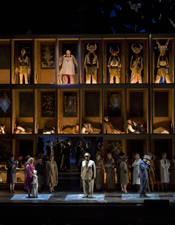 A scene from John Adams’s Doctor Atomic. [Photo by Ken Howard courtesy of Metropolitan Opera]
A scene from John Adams’s Doctor Atomic. [Photo by Ken Howard courtesy of Metropolitan Opera]
There is, in fact, a great deal of musical interest going on during
Doctor Atomic – in the pit. There are genuinely intriguing
sounds, developments, inspired innovations of percussion, melodies that spin
and writhe and tingle. As a symphonic meditation on nuclear energy and its
destructive implications, this would be an evening worth spending.
Adams’s purely instrumental music is often impressive, sometimes deeply
feeling. As the accompaniment for stage action and a work of vocal theater,
however, Doctor Atomic let me down.
The libretto was certainly at fault – it’s very difficult to create poetic, metaphorical feeling on the grandiose level on which this work pompously and preachily insists if the words you hear remain sullenly, risibly pedestrian. Bets on the amount of radiation. Nervous but hardly profound discussions of the implications of the weapon. Pros and cons of dieting. A sonnet by John Donne that might be a step in the right direction if it had anything to do with the action, and if the setting were at all appropriate or at least appealing. (How on earth can anyone make a New Mexico sky at sunset, or during a thunderstorm, dull?) A vision from the Bhagavad Gita and a lullaby by a Native American seem designed merely to cover extra cultural bases – and the lullaby, insistently chanted to keep us mindful of the coming catastrophe (well, Native American songs often are one or two lines, repeatedly chanted) does not build tension – it gives evidence that tension is what they creators of this work would like to provide. But, words and music, they have no idea how to go about it.
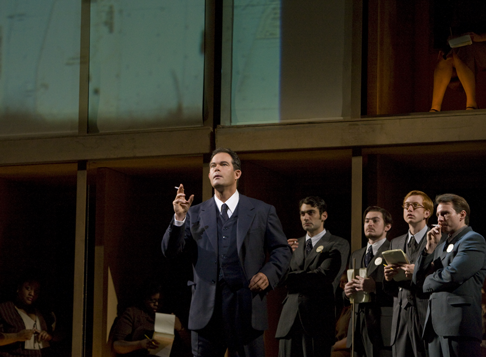 A scene from John Adams’s Doctor Atomic with Gerald Finley (center) as J. Robert Oppenheimer. [Photo by Ken Howard courtesy of Metropolitan Opera]
A scene from John Adams’s Doctor Atomic with Gerald Finley (center) as J. Robert Oppenheimer. [Photo by Ken Howard courtesy of Metropolitan Opera]
The voices are well produced, but they are deployed as electronic instruments might be: as notes on a page, not as instruments of emotional utility. Everyone in this opera is ordinary but no one is human. Even the gods of Wagner and Gluck get to be human. (I am told Gerard Finley’s personal agonizing, as Oppenheimer, was poignant on screen, but in the house, mediated by microphone, it made very little effect. Sasha Cook sounded good, but whether her character, Kitty Oppenheimer, was agonized by her marriage or the bomb or wondering what to pay the babysitter was not apparent from her vocalises.)
The staging is certainly at fault – like the libretto, it harps on the inanity of the human activity that led to such profound consequences, without illuminating either one. If you’re going to symbolize world-catastrophe, you have to make it personal, but Sellars and Adams cannot make their inventions live. They can’t even make them explode. Oh for a Mozart. No, there aren’t many Mozarts – oh for a Ponchielli or a Meyerbeer, journeymen who knew how the machine worked, how to put catastrophe on stage, how to make it personal and real to a large, disparate audience. How about a hunchbacked scientist who invents a bomb out of vendetta on his society and discovers too late that it has torn the skin off his own beloved daughter? That might be an opera. If you could find a Verdi to compose it.
Instead we get the Oppenheimers’ marital problems, a failure to communicate, though thanks to the sound system, heaven knows they are loud enough. This scientist represents this argument, that scientist represents another one, and none of them are either human or archetypal enough to be superhuman. Just cardboard. One could forgive that if their music was interesting, but the vocal lines are uniformly un.
At the Met last spring, Satyagraha, with its diorama staging and intentionally incomprehensible libretto (in Sanskrit), was a vocal drama of real excitement and beauty, with metaphorical actions giving access to the creators’ meditations on significant philosophical questions. There was no suspense in Doctor Atomic, and nothing in the debate around the atomic bomb was brought to life in it.
Arjuna’s Dilemma is another recent opera based, in part, on the text known as the Bhagavad Gita, the most famous (and philosophical) episode from the Mahabharata, the longest epic ever composed. With Satyagraha and Doctor Atomic, this is the third opera I’ve seen this year that drew on the Gita – which has become the Orlando Furioso of modern opera, as the Gita itself and its characters grow as familiar to opera-goers as Ariosto’s characters were to music lovers of Handel and Vivaldi’s day.
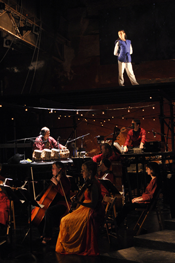 Badal Roy on tablas (foreground) and John Kelly as Krishna (center) from Arjuna’s Dilemma [Photo by Stephanie Berger]
Badal Roy on tablas (foreground) and John Kelly as Krishna (center) from Arjuna’s Dilemma [Photo by Stephanie Berger]
In the Gita, Prince Arjuna, driven (with his four brothers) from
their kingdom by some sneaky cousins, is about to take part in a murderous
battle with the usurpers, and has doubts about the whole thing –
killing, being killed, slaying all those pals he used to hang with, spreading
mayhem through the countryside and no doubt into the heart of many a widow
and orphan and bereft parent. What’s it all for? His
charioteer, however, assures him that life goes on (and everyone who dies
will be born again anyway), that he’s just one cog in the great big
wheel of life which will cease to turn if people stop to question their
proper position. Of course he’s no mere charioteer – he’s
none other than the god Krishna, and vouchsafes the prince a vision of the
universe as symbolized by his ineffable self. (This is the bit that
Oppenheimer saw in Doctor Atomic.) Arjuna, convinced and
enlightened, fights on. (Where was Krishna when Achilles had his far less
worthy doubts in the Iliad? – you may well wonder.)
Douglas Cuomo has turned the Gita into an opera, making use of amplified voices, Indian percussion, cellos, saxophones, a bass clarinet from the Western tradition, background film, foreground choreography, titles to translate the Sanskrit and English text, all the bells and whistles of modern opera-creation as deployed, also, by John Adams at the Met. The techno wonders are all here (in BAM’s self-consciously decrepit Harvey Theater, a credible scene of battle), and the grandeur of the presentation matches the grandeur of the conception.
But the experience of Arjuna’s Dilemma is a very different one from the experience at the Met. Partly this is a matter of length – Arjuna is about 70 minutes, no intermission – and partly this is a matter of lack of pretension. The story is a wisdom text not an action text, a central prescription for the life well-lived in Hindu terms, a revelation of the god, but one does not feel preached at, manipulated, in this work – and there is no attempt to tie the extraordinary to the mundane in the way that a troubled marriage and the quotidian concerns of the scientists totally failed to achieve in the gaudier piece.
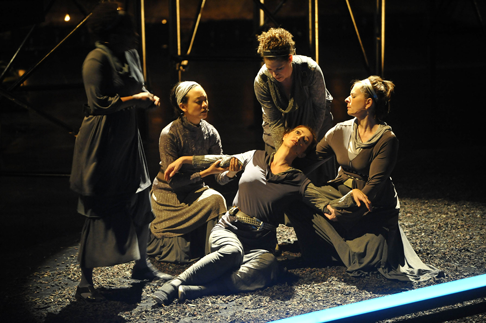 (l-r) Anita Johnson, Bora Yoon, Suzan Hanson, Kirsten Sollek, and Barbara Rearick from Arjuna’s Dilemma [Photo by Stephanie Berger]
(l-r) Anita Johnson, Bora Yoon, Suzan Hanson, Kirsten Sollek, and Barbara Rearick from Arjuna’s Dilemma [Photo by Stephanie Berger]
Most of all, Arjuna’s Dilemma has been created by a composer who trusts sound, a few fine voices and a few fine virtuoso instrumentalists, to reveal his message in the same way that the great opera composers trust the sounds will bring to us. The singers’ art (and the instrumentalists’ art) is the central focus of the work. The message is not made explicit and ordinary, humdrum, as Peter Sellars’s text did in Doctor Atomic; its meaning comes to us subtly, open to our different levels of understanding, on the beauty of the human voice, of melody working sinuously to take us into trance states while we meditate, line by line, on the brief story being told us. Tony Boutté impersonates Arjuna, dancer John Kelly (who has also choreographed the piece) plays – but Humayun Khan sings – Krishna, advising, consoling, manipulating, guiding him. Their words are taken up, repeated, sung in canon, tossed about, harmonized by a chorus of five women, and the beauty of the sounds they make expresses a message never made explicit. We draw our own moral. The instrumentalists, too, are virtuosos, and take part in the dialogue. No message goes on too long before it evolves into a new manner of presentation, giving us in this brief space some hint of the breadth of the message, the universality of it.
The piece concludes without a gimmick: they have said what they wanted to say, we have taken in what our individual senses and understanding have prepared us to take. A tale has been told. We have not been told what to feel. We feel for ourselves.
Arjuna’s Dilemma is a modern opera, a tale told through singing.
John Yohalem